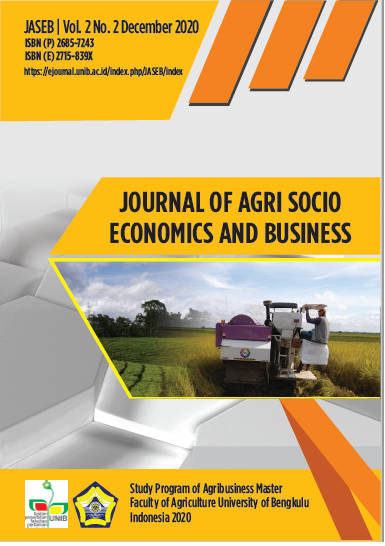Main Article Content
Abstract
In recent years there has been a change in the function of
oil palm plantations to rice. About 370 hectares of oil palm
and swamp plantations in Mukomuko District, Bengkulu,
were converted into new rice fields. This research aims to
examine the social and economic impacts of land
conversion. The location selection was done purposively
and the respondent determination was done by using the
solvin method, which resulted in 181 respondents. For data
analysis using qualitative and quantitative methods. The
research results explain the social impact of farmers
gathering in the fields more frequently at planting,
fertilizing, spraying pests, and at harvest time. Farmers who
were previously very consumptive, especially when the
price of palm oil increased and experienced difficulties
when the price of fresh fruit bunches fell, are now more
careful in financial development. The environment around
the mainland is now more beautiful and the air quality is
getting better. As well as more frequent deliberations
related to policies and counseling on paddy farming. The
economic impact of paddy farming generates an income of
Rp. 36,151,207 / field / hectare / year while oil palm
farming is Rp. 28,308,303 / agriculture / hectare / year.
Keywords
Article Details
An author who publishes in the Journal of Agri Socio Economics and Business agrees to the following terms:
Author retains the copyright and grants the journal the right of first publication of the work simultaneously licensed under the Creative Commons Attribution-ShareAlike 4.0 License that allows others to share the work with an acknowledgement of the work's authorship and initial publication in this journal
Submission of a manuscript implies that the submitted work has not been published before (except as part of a thesis or report, or abstract); that it is not under consideration for publication elsewhere; that its publication has been approved by all co-authors. If and when the manuscript is accepted for publication, the author(s) still hold the copyright and retain publishing rights without restrictions. For the new invention, authors are suggested to manage its patent before published. The license type is CC-BY-SA 4.0.
Journal Agri Socio-Economics and Business is licensed under a Creative Commons Attribution-ShareAlike 4.0 International License.
